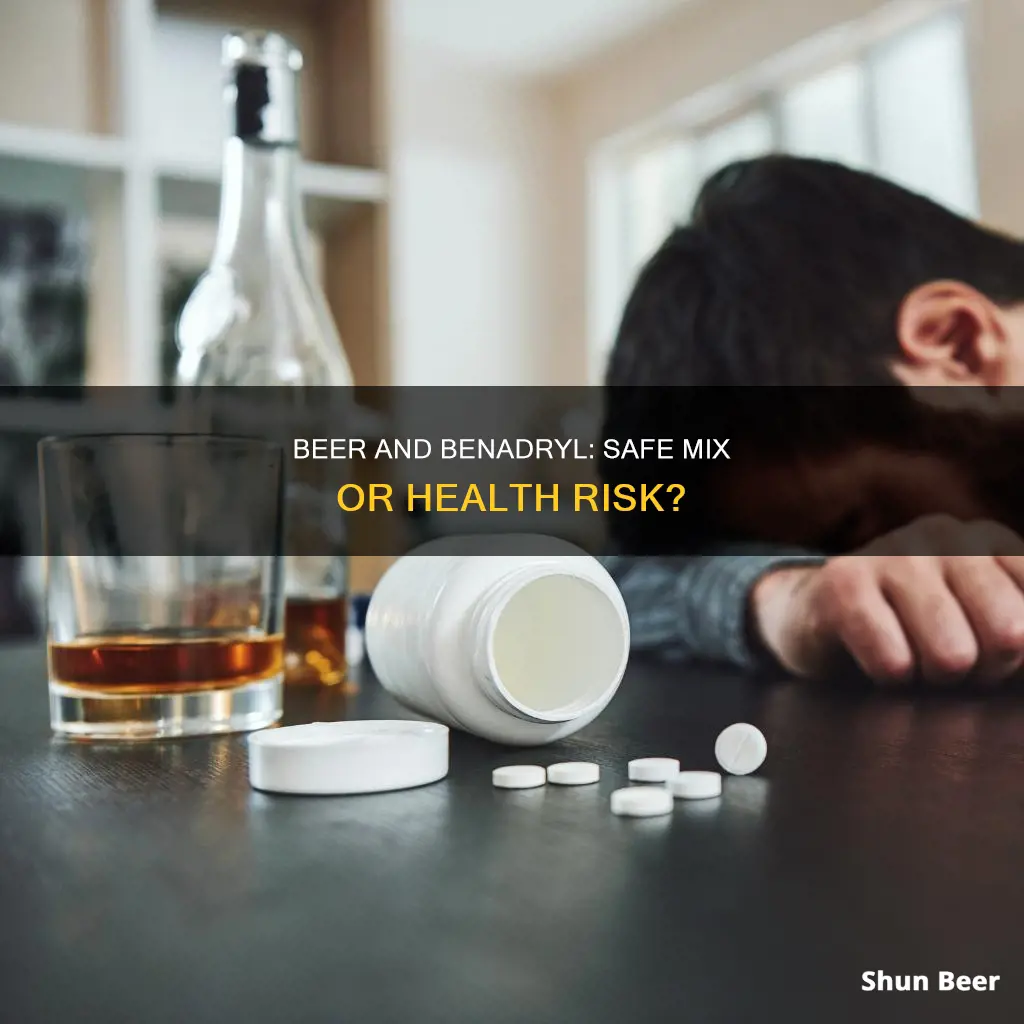
Benadryl is a popular over-the-counter medication used to treat allergy symptoms. It is an antihistamine, a drug that blocks the action of histamine, a compound in the body that causes allergic reactions. While Benadryl can be effective in managing allergies, it is important to be aware of its potential side effects and interactions with other substances, such as alcohol. Mixing Benadryl and alcohol can lead to adverse effects and serious health risks. Both substances are central nervous system (CNS) depressants, which means they slow down the CNS, resulting in increased drowsiness, impaired coordination, and difficulty performing physical and cognitive tasks. This combination may also lead to dehydration, memory impairment, and a higher risk of accidents, falls, and overdose. It is generally recommended to abstain from alcohol while taking Benadryl to avoid these potential dangers.
| Characteristics | Values |
|---|---|
| Should you take Benadryl after drinking a beer? | No, it is not recommended to mix Benadryl and alcohol. |
| Why? | Both substances are central nervous system (CNS) depressants, which can lead to severe side effects such as drowsiness, sedation, impaired coordination, and difficulty performing physical and mental tasks. |
| What are the risks? | Increased risk of accidents, falls, overdose, respiratory depression, and other life-threatening problems. |
| Who is at higher risk? | Older adults, people with certain health problems, and women. |
| How long should you wait after taking Benadryl before consuming alcohol? | It is recommended to wait at least 24 hours, or until the Benadryl has fully left your system (about 2 days after the last dose). |
What You'll Learn

Mixing Benadryl and alcohol increases the risk of accidents and falls
Benadryl (diphenhydramine) and alcohol are both central nervous system (CNS) depressants. When mixed, they can slow down the CNS too much, intensifying side effects like drowsiness, dizziness, and impaired coordination and increasing the risk of accidents, falls, and overdose.
Heightened Side Effects
As central nervous system depressants, both Benadryl and alcohol slow down the CNS. When mixed, they can slow down the CNS too much, triggering heightened side effects. These include problems with concentration and physical tasks, sedation, and drowsiness. The National Highway Traffic Safety Administration suggests that Benadryl may even have a greater effect on a driver's alertness than alcohol. Combining the two can also lead to respiratory depression and other life-threatening problems.
Increased Risk of Accidents and Falls
The intensified side effects of mixing Benadryl and alcohol can impair a person's daily functioning, making activities that require alertness, such as driving or operating machinery, extremely dangerous. The combination can also increase the risk of falls, especially in older adults, due to impaired motor skills and dizziness.
Dehydration
Both Benadryl and alcohol can dehydrate the body, and when combined, they increase the risk of dehydration, which can cause discomfort and worsen hangovers.
In summary, mixing Benadryl and alcohol can have dangerous consequences and increase the risk of accidents and falls due to heightened side effects, impaired coordination, and dehydration. It is medically advisable to abstain from alcohol completely while taking Benadryl to avoid these risks.
Carnivore Diet: Beer Friend or Foe?
You may want to see also

It can lead to respiratory depression and other life-threatening problems
Benadryl and alcohol are both central nervous system (CNS) depressants. When taken together, they can slow down the CNS too much, leading to severe side effects. One of the most serious consequences of this combination is respiratory depression, which can be life-threatening.
Respiratory depression occurs when the CNS is depressed, slowing down essential functions like breathing. When the CNS is overly suppressed, it can lead to a significant decrease in respiratory rate, which can have severe and even fatal consequences. As both Benadryl and alcohol are CNS depressants, taking them together can heighten this effect and lead to respiratory depression.
The impact of Benadryl and alcohol on the CNS can also cause sedation and drowsiness, impairing an individual's alertness and coordination. This can increase the risk of accidents, falls, and injuries. In severe cases, it may even lead to a loss of consciousness. Operating vehicles or heavy machinery while under the influence of this combination is extremely dangerous and should be avoided.
In addition to respiratory depression, the combination of Benadryl and alcohol can also lead to other life-threatening problems. For example, both substances are known to cause dehydration, and when combined, they can increase the risk of severe dehydration, which may require medical attention. Additionally, this combination can also increase the risk of overdose due to their combined sedative effects on the CNS.
The risks associated with mixing Benadryl and alcohol are serious and should not be taken lightly. It is medically advisable to abstain from alcohol completely while taking Benadryl to avoid these potentially dangerous consequences. If you or someone you know has unintentionally mixed these substances, it is important to rest in a safe environment to restore balance.
The Magic Behind Beer Ripples: How Does It Work?
You may want to see also

Both substances are central nervous system depressants
Benadryl (diphenhydramine) and alcohol are both central nervous system (CNS) depressants. This means they slow down the CNS, which consists of the brain and spinal cord. When taken together, they can slow down the CNS too much, intensifying side effects like drowsiness, dizziness, and impaired coordination. This can lead to dangerous consequences, such as accidents, falls, and even overdose.
The combined impact of Benadryl and alcohol on the CNS can result in heightened sedation and drowsiness, making it difficult to perform physical and cognitive tasks that require alertness. Driving or operating heavy machinery under the influence of this combination is extremely risky and should be avoided. Mixing Benadryl and alcohol can also lead to respiratory depression and other life-threatening problems.
In addition to the CNS depressant effects, both substances are known to cause dehydration. When combined, they increase the risk of dehydration, which can cause discomfort and worsen hangovers. While the drowsiness induced by Benadryl and alcohol might seem like a good idea for a better night's sleep, it can actually lead to adverse side effects such as nausea and dizziness, disrupting normal sleep patterns.
The dangers of mixing Benadryl and alcohol are particularly pronounced in older adults. Aging slows down the body's ability to break down alcohol, increasing the time it stays in the system and prolonging the risk of harmful interactions. Additionally, the combination can create problems with motor skills in seniors due to the dizziness and sedation caused by both substances, increasing the risk of falls.
While the risks associated with mixing Benadryl and alcohol may not apply in all scenarios, it is medically advisable to abstain from alcohol completely while taking this medication. If you are considering taking Benadryl and alcohol simultaneously, refrain from engaging in any tasks that require mental alertness, and do not operate vehicles or machinery. Always consult your healthcare provider before mixing medications, as variables like age and other medications can intensify the likelihood of adverse outcomes.
Beer and Teenagers: What's the Deal?
You may want to see also

Mixing the two can cause dehydration
Benadryl and alcohol are both central nervous system (CNS) depressants. While taking Benadryl on its own does not directly affect the liver, when taken with alcohol, the combined impact on the CNS can be dangerous. Both substances are known to have dehydrating effects on the body, and when mixed, the risk of dehydration increases. This can lead to discomfort and worsen a hangover the next day.
Dehydration occurs when the body loses more fluids than it takes in. Alcohol is a diuretic, which means it increases the production of urine. This can lead to dehydration if fluids are not replaced. Benadryl can also contribute to dehydration by increasing fluid loss through sweating and reducing fluid intake due to its sedative effects.
The combination of Benadryl and alcohol can intensify the side effects of both substances, including drowsiness, dizziness, and impaired coordination. This increases the risk of accidents, falls, and difficulty performing daily tasks. It is important to note that the risks associated with mixing Benadryl and alcohol are not universal and may depend on factors such as age, gender, and other medications being taken. However, it is generally medically advisable to abstain from alcohol completely while taking Benadryl.
The dehydrating effects of mixing Benadryl and alcohol can have several consequences. Dehydration can cause discomfort, headaches, and loss of concentration. It can also worsen the side effects of Benadryl and alcohol, leading to a more severe hangover. Additionally, dehydration can impact the body's ability to regulate temperature, leading to overheating or hypothermia. In severe cases, dehydration can cause organ damage and even death.
To avoid dehydration when taking Benadryl, it is important to increase fluid intake and avoid excessive alcohol consumption. It is also advisable to rest and restrict alcohol use, especially when fighting a virus. If you unintentionally mix Benadryl and alcohol, resting in a safe environment can help restore balance.
Beer and Diabetes: What Type 2 Patients Need to Know
You may want to see also

It can increase the risk of overdose
Mixing Benadryl and alcohol can increase the risk of overdose due to their combined sedative effects on the central nervous system. Benadryl (diphenhydramine) is an antihistamine that helps to reduce allergy symptoms, including rashes, coughs, and irritated eyes, throat, and nose. While it does not directly impact the liver, Benadryl is a central nervous system (CNS) depressant, just like alcohol.
When taken together, Benadryl and alcohol can slow down the CNS too much, leading to dangerous side effects. These side effects include extreme drowsiness, sedation, difficulty performing physical and cognitive tasks, impaired coordination, and slowed breathing. The risk of overdose is further increased as both substances are known to cause dehydration, which can lead to discomfort and worsen hangovers.
The combination of Benadryl and alcohol can be especially risky for older adults, as aging slows down the body's ability to break down alcohol. Additionally, Benadryl may interact with other medications, increasing the likelihood of adverse outcomes when mixed with alcohol. It is important to consult a healthcare professional before mixing any medications or substances, including Benadryl and alcohol, to ensure safe use.
To reduce the risk of overdose, it is recommended to abstain from alcohol completely while taking Benadryl. If you unintentionally mix alcohol and Benadryl, it is important to rest in a safe environment to restore balance. Seeking medical advice is always a good idea if you are unsure about the safety of mixing medications and substances.
Beer and Cholesterol: Drinking Before a Test
You may want to see also







